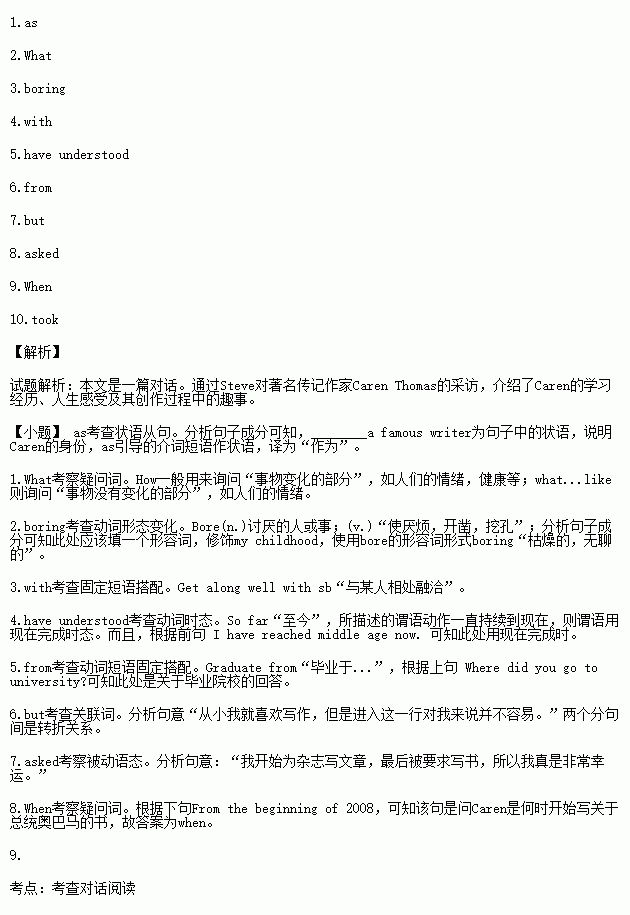题目内容
Steve is interviewing the famous biographer(传记作家)Caren Thomas.
Steve: Thomas, 1. a famous writer, would you please tell us something about yourself and your new books?
Garen: Of course.
Steve: Where were you born?
Garen: I was born in Chicago, but I spent most of my childhood in New York.
Steve: 2. was your childhood like?
Garen: I had pretty strict parents. They wished me to be successful in studies. So I think my childhood was 3. (bore)and I was always complaining about it.
Steve: Do you get along well 4. your parents now?
Garen: Oh sure, I have reached middle age now. So far I 5. (understand)their loves to me.
Steve: Where did you go to university?
Garen: I graduated 6. Yale University with a degree in English Literature.
Steve: How did you start writing?
Garen: I like writing from young, 7. it is not easy for me to enter this occupation. You know, I once worked in companies. I started writing for magazines and eventually was
8. (ask) to write books, so I was pretty lucky.
Steve: 9. did you begin to write the book about the president Obama?
Garen: From the beginning of 2008, it 10. (take) me 6 months to prepare for it, interviewing and finding information about him. Obama told me many stories about his life and family.
Steve: Sounds interesting.
 寒假大串联黄山书社系列答案
寒假大串联黄山书社系列答案Summer Hours
June 15 - September 15
Saturday - Thursday: 8:00 am - 8:00 pm
Friday: 9:00 am - 9:00 pm
Regular Hours
January 1 - June 14 and September 16 - December 31
Saturday - Thursday: 8:00 am - 5:00 pm
Friday: 9:00 am - 9:00 pm
Individual Ticket Prices
Venues | Adult(12+) | Senior(60+) | Child(3 - 11) | Group(at least 3 persons) |
Exhibit | Halls | Exhibit | Halls | Exhibit |
Exhibits:
◆ A Bird’s World
This exhibit includes a sample of every bird found in New England. It provides a lot of information about bird behavior, and New England birdwatchers will also find a useful bird “dictionary”. With this, you can learn how to understand the bird language you hear being chirped just outside your window at home.
◆Butterfly Garden
This garden offers a wonderful chance to get close to all kinds of living butterflies from New England and across the world. You can also look inside the “Emergence Box” to see hanging chrysalids(蝶蛹)change into adult butterflies. If you’re lucky, you might see a new butterfly crawl out of its casing.
◆Discovery Center
Designed for children under 8 and their parents, the Discovery Center offers lots of fun, hands - on activities that are designed to help them discover through playing. A perfect area for early learners, this educational environment emphasizes the use of real objects for exploring natural history, physical science, and technology topics.
◆Take a Closer kook
Explore the world around you using sight, hearing, touch and smell. Test yourself to see what you can discover when you pay attention to your senses, and learn how technology extends them.
1.If you visit the exhibits on a Wednesday in August, you can stay there until ________.
A. 3 pm B. 8 pm C. 9 pm D. 5 pm
2.A child at 5 and its parents will have to pay ________.
A. $60.00 B. $80.00
C. $20.00 D. $68.00
3.People, who are interested in the human body, can visit ________.
A. Take a Closer Look B. Butterfly Garden
C. Discovery Center D. A Bird’s World
4.The passage is an advertisement of _________.
A. a sight - seeing park B. a science park
C. a training center D. an art center

